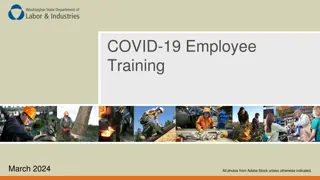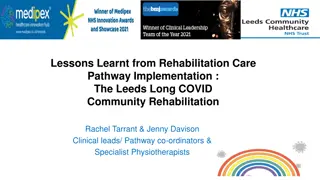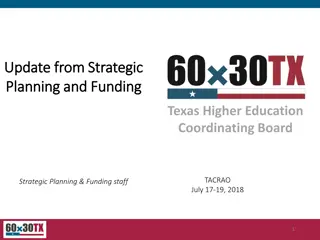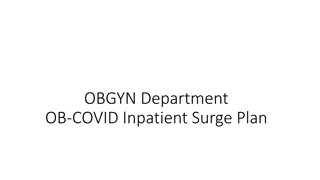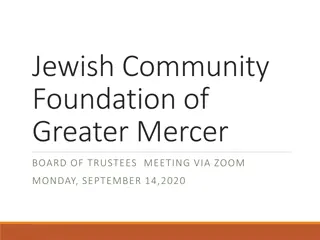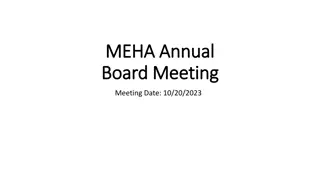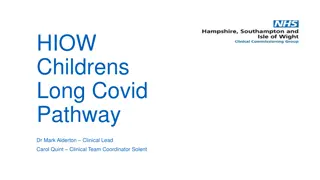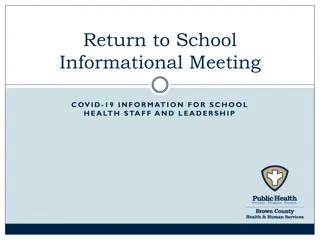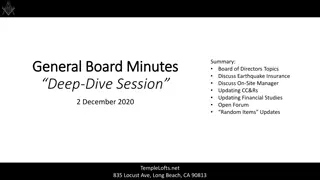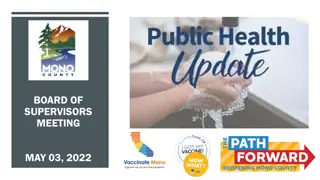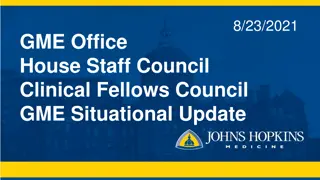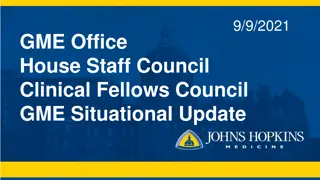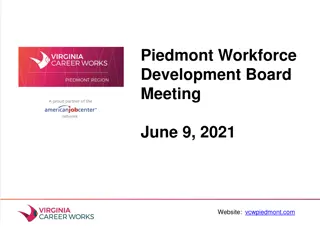COVID-19 Higher Education Update - Board of Higher Education Meeting
In light of the COVID-19 pandemic, the Board of Higher Education has been actively involved in coordinating emergency responses and updates for higher education institutions. From implementing remote learning to managing campus closures, this update covers significant actions taken by the Baker Administration, segment responses, and internal/external communications within the higher education community.
Download Presentation

Please find below an Image/Link to download the presentation.
The content on the website is provided AS IS for your information and personal use only. It may not be sold, licensed, or shared on other websites without obtaining consent from the author.If you encounter any issues during the download, it is possible that the publisher has removed the file from their server.
You are allowed to download the files provided on this website for personal or commercial use, subject to the condition that they are used lawfully. All files are the property of their respective owners.
The content on the website is provided AS IS for your information and personal use only. It may not be sold, licensed, or shared on other websites without obtaining consent from the author.
E N D
Presentation Transcript
COVID-19 Higher Education Update Board of Higher Education Meeting April 8, 2020
COVID-19 Higher Education Update Overview DHE COVID 19 Emergency Team: Commissioner Santiago Katy Abel Stacy Bougie Dena Papanikolaou Elena Quiroz-Livanis Amanda Robbins Tom Simard Emergency Team has been fully active since March 9th Working with EOE and segments daily (more detail ahead) 3
COVID-19 Timeline Baker Administration Actions March 17th Issues new guidance for exec branch employees, extending telework until April 3rd March 13th Issues order limiting gatherings to 250 people March 23rd Orders all non-essential businesses to cease in- person operations; limit gatherings to 10 people March 10th Declares State of Emergency and issues guidance for Executive Branch employees March 15th Emergency actions including: March 25th/31st Announces extension of the following orders until May 4th: School closures Essential businesses only in-person operations Gatherings limited to 10 people Telework for Executive Branch employees Limit gatherings to 25 Prohibiting on-site food/ beverage consumption Non-emergency exec branch employees do not report to work Mar 16&17 March 12th Announces order modifying State s open meeting law 4
COVID-19 Higher Education Update Segment Response and Updates Classes have been moved to remote learning through the remainder of the semester Number of students live in residence halls State Universities: ~300 across 9 institutions UMass: approx. ~1,000 across 4 institutions Staff working remotely: ~90% - 95% Those working onsite are fulfilling essential services Prorated refunds for room & board, meal plans, and parking Impact on students Long-Term Impact on Higher Ed Institutions 5
COVID-19 Higher Education Update IHE Internal and External Communications Daily Virtual Meetings EOE/DHE and Segment Leads Community Colleges State University UMass Independent Institutions EOE Secretariat-wide with all Education Agencies DHE Cabinet Check-In Weekly Calls Hosted by MEMA/DPH Includes over 400 higher ed stakeholders Presidents, COVID POCs, CFOs, health center directors, segment leads, union representatives, NECHE 6
COVID-19 Higher Education Update DHE Resources Public Health Guidance Issued March 17th by DHE in coordination with DPH and EOE DHE FAQs Issued March 26th to address questions related to: Academic Integrity Administration and Finance Grants Student Charges Student Supports Workforce/Employee Relations Working document that will be updated as needed DHE Covid-19 Resource Page COVID-19 Inbox for Public Inquiries 7
COVID-19 Higher Education Update Overview of the Federal Stimulus CARES ACT (Higher Education Funding $13.9B) 90% ($12.6B) will be allocated directly to institutions by the US Department of Education through the Title IV distribution system. 75% based upon full-time equivalent enrollment of Pell students, and 25% based upon full-time equivalent enrollment of non-Pell students. Students who were exclusively online are excluded from calculation. At least 50% ($6.3B) awarded to IHEs must be used to provide direct emergency aid to students, including grants to students for food, housing, course materials, technology, health care, and childcare. Many allowable uses for the IHE portion, including defraying the cost of revenue loss and new costs associated with COVID-19 mitigation. 8
BHE 20-08 Approval Of Massachusetts State College Building AuthorityRefunding Revenue Bonds The Massachusetts State College Building Authority is hereby authorized to issue refunding bonds to refund certain of its outstanding bonds, provided the aggregate net present value savings achieved from the refunding is no less than four percent (4%) of the par amount of refunded bonds, and the Commissioner is hereby authorized and directed, in the name and on behalf of the Board of Higher Education, to approve in writing the issuance by said Authority of bonds for such refunding purpose. 12
Financial Assessment and Risk Monitoring - Implementation and NECHE MOU Board of Higher Education Meeting April 8, 2020
Financial Assistance and Risk Monitoring (FARM) Implementation Timeline Overview April 2018: Mount Ida College announces abrupt closure June 2018-January 2019: THESIS recommendations; BHE accepts report (BHE 19-04) January June 2019: Informal stakeholder vetting; regulation drafting June 18, 2019: BHE votes to put draft regulations out for formal public comment (BHE 19-06) June August 2019: Public comment period; DHE staff revise regulations November 14, 2019: Legislation enacted and signed November- December 2019: DHE staff revise regulations January 10, 2020 BHE Meeting: BHE Vote on final regulations (BHE 20- 03); ongoing NECHE MOU negotiations April 8, 2020: BHE Vote related to implementation (MOU); immediate implementation Summer-Fall 2020: implementation and periodic updates to BHE 14
Financial Assistance and Risk Monitoring (FARM) BHE 20-09: Implementation Plan Implementation Procedures For information and comment Proposal to move forward with NECHE MOU (Vote) Set of guiding principles (essential terms) Delegated authority to Commissioner 15
Financial Assistance and Risk Monitoring (FARM) FARM Regs: Scope and Purpose Scope: All MA-based, private higher education institutions (IHEs) located in MA and authorized to grant degrees Purpose of Regulations: Establish standards and processes to permit BHE (acting through Commissioner/ DHE) to: identify, through annual screening, IHEs experiencing significant financial distress, placing them at risk of imminent closure; assess and monitor identified IHEs while they either improve their financial condition or transition to closure; and require risk mitigation plans, contingency closure planning and timely public notification in the event of imminent closure. 16
FARM Implementation Procedures Describes methodology used in DHE financial screenings NECHE MOU*- Incorporates into annual financial assessment process screenings conducted by NECHE, pursuant to valid, current MOU Provides procedural guidance to IHEs in development of: risk mitigation plans, public notices and contingency plans for closure Advisory committee- describes composition and responsibilities (Standing Committee) 17
NECHE MOU- Context New law* requires BHE to establish process to annually assess each IHE s financial information for at risk of imminent closure determination: such assessments may be based on financial screenings conducted by an accrediting agency (NECHE), pursuant to an MOU. Mutual value in aligning BHE and NECHE financial assessment processes: Increasing efficiencies Reducing administrative burdens on IHEs Eliminating inconsistent findings Sharing information/expertise Commissioner has reached agreement on essential NECHE MOU terms: NECHE would conduct the initial annual screenings; NECHE would share with DHE staff all IHEs that screened-in under the NECHE methodology; and DHE would engage with IHEs screened-in to further assess each IHE s financial status and identify IHEs that may be at risk of imminent closure. * An Act to Support Financial Stability in Higher Education, St. 2019 c.113, 18
NECHE MOU- Essential Terms Essential terms (guiding principles) of the MOU: NECHE shall use a robust screening methodology with multiple metrics to ensure that its screening results are based upon range of financial and non- financial indicators of an IHE s financial capacity. NECHE shall share that screening methodology with DHE so DHE can validate NECHE screening process, methodology and outcomes. Content of data share: For each IHE that screens in, NECHE shall share, no later than March of each year, the name of each IHE, along with the screening methodology and results for each IHE. Compliance assurances: NECHE shall annually certify by or before December of each year that NECHE has identified to DHE all IHEs which, based on NECHE s screening methodology, may be at risk of imminent closure. Emphasis on importance of mutuality of information sharing & periodic review (next slide) 19
NECHE MOU- Essential Terms Both parties agree to share information and consult with one another throughout the year on IHEs identified outside of annual financial screening process as financially fragile or at risk, and: In anticipation of the potential impact of the COVID-19 pandemic on institutional enrollment and resources, both parties understand the importance of construing this [information-sharing] provision liberally and engaging in frequent, on-going and timely information-sharing throughout the year regarding any facts or circumstances which come to the attention of either party and which call into question the financial health or stability of an institution. NECHE and the DHE shall consult periodically to review NECHE s screening methodology and to generally assess the effectiveness of the cooperative arrangement. 20
Implementation Procedures for FARM work FARM- Next Steps April 8, 2020 Finalize and execute MOU with NECHE for screening process Form Standing Advisory Committee Conduct initial screenings Receive information from NECHE re: NECHE accredited IHEs that have screened-in Conduct DHE screenings on non-NECHE accredited institutions Assess IHEs based on screening information Conduct outreach to identified IHE s as outlined in Implementation Procedures, consistent with statute and regulations May 2020 (BHE meeting)- Commissioner Update Summer- Fall 2020 Active engagement with identified IHEs Active information-sharing to and from NECHE Academic Year 2020-2021- Periodic updates to BHE 21
BHE Motion 20-09 The Board of Higher Education hereby: Receives the FARM Implementation Procedures and authorizes Commissioner to move forward as outlined Approves the guiding principles that shall govern an MOU with NECHE to conduct financial screenings of private IHEs, consistent with the FARM regs & statute. Delegates to Commissioner authority to finalize and execute an MOU with NECHE, in consultation with Chair and Secretary, consistent with said principles. Directs Commissioner to report back to BHE next month and periodically thereafter. 23
BHE 20-10 Delegation of Authority to the Commissioner to Act in Between Regularly Scheduled Board Meetings On March 10, 2020, the Governor declared a public health state of emergency for the Commonwealth of Massachusetts to prepare for, respond to, and mitigate the spread of COVID-19. While the Governor s state of emergency is in effect, the Board of Higher Education hereby delegates to the Commissioner authority to take such action in between regularly scheduled Board meetings as is deemed necessary or desirable, provided: Such action is for good cause, is related to or arises out of the state of emergency, and is authorized or does not conflict with state or federal law; and The Commissioner takes such action in consultation with and upon the advice of the Chair or Vice Chair of the Board. The Commissioner is directed to report back to the Board on whether and how the Commissioner exercised such delegated authority. 25



